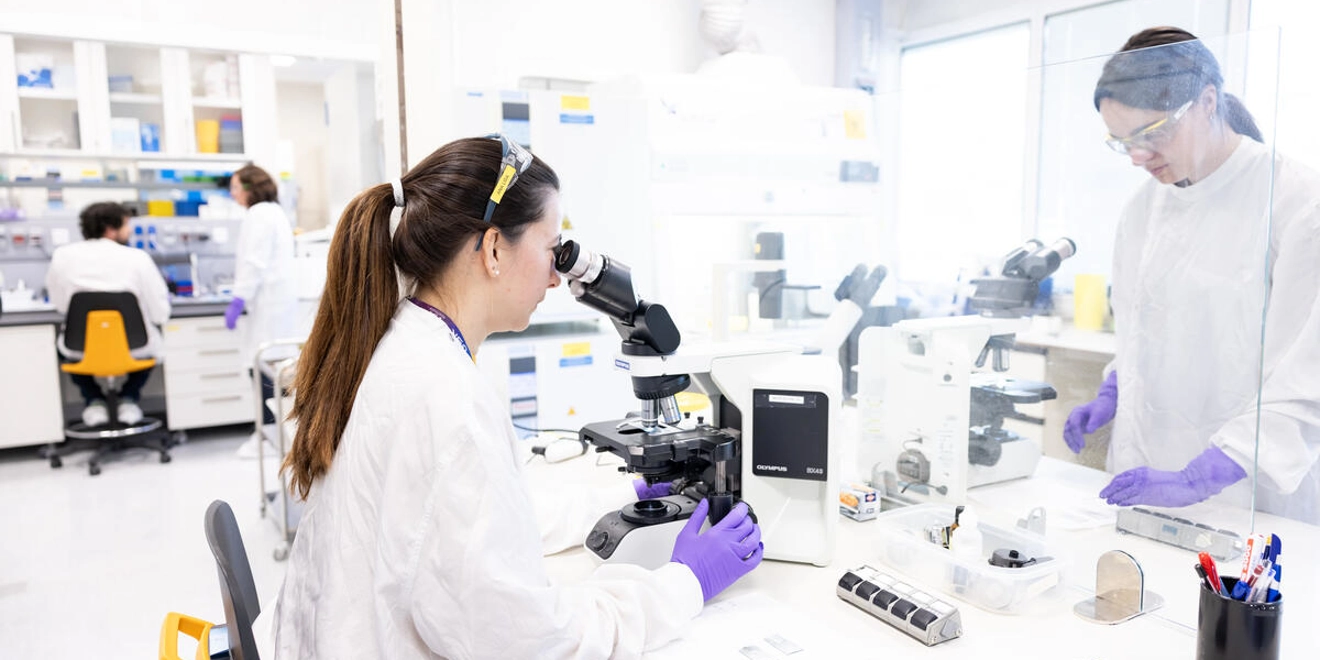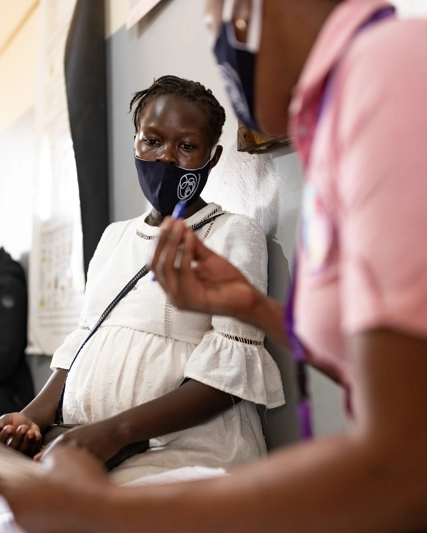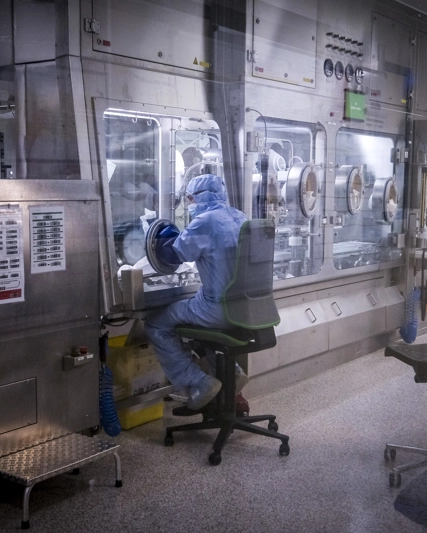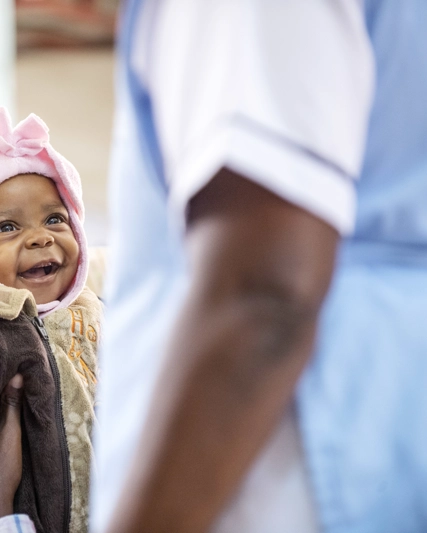Using our science for global health
We develop new ways to prevent and treat high burden diseases in lower-income countries with a focus on infectious diseases.

Our £1bn investment over ten years is helping accelerate global health R&D, focusing on new vaccines and medicines to help prevent and treat malaria, TB, diseases driving AMR and neglected tropical diseases (NTDs). We have two R&D hubs focused on developing a world-leading global health pipeline.
Our Global Health Medicines R&D is based in Tres Cantos, Spain, and is focused on developing its industry-leading pipeline in TB, malaria and NTDs. In TB we're finding shorter and simpler combinations to tackle resistance and in malaria, we're focused on developing new and innovative tools to get ahead of disease.
The GSK Vaccines Institute for Global Health (GVGH) in Siena, Italy, leads our strong vaccine portfolio focused on preventing enteric and diarrhoeal diseases. The team is also focused on exploring novel technologies for lower income countries for example GMMA, and developing a next-generation malaria vaccine.
By the end of 2024, we had invested 33% of our £1bn investment and progressed 6 global health pipeline assets to address priority WHO diseases, including climate aggravated diseases that disproportionately affect lower income countries.1
Our focus
Our global health R&D pipeline aims to deliver transformative medicines and vaccines and our efforts are focused on the highest burden diseases in lower income countries: malaria, TB, HIV (through ViiV Healthcare) AMR and NTDs and viral threats.
Malaria
We support the global elimination of malaria by improving prevention and treatment for children and vulnerable populations. Our industry-leading pipeline is looking at developing novel antimalarial medicines to tackle resistance and exploring a next-generation malaria vaccine.
Tuberculosis
Our focus is on transforming how TB is prevented and treated to contribute to ending the epidemic. Our TB medicines pipeline includes potential treatments that could be shorter and active against drug-sensitive and drug-resistant strains of TB.
Antimicrobial resistance
By finding new ways to prevent infectious diseases, we aim to reduce the burden of AMR to contribute to long-term health security. Our global health portfolio is focused on enteric and diarrhoeal diseases and other high-burden pathogens including typi/paratyphi and invasive nontyphoidal salmonella (iNTS).
NTDs and viral threats
We are helping contribute to the elimination and control of neglected tropical diseases (NTDs) and viral threats while expanding access to GSK assets. We carry out targeted R&D for the highest need NTDs and viral threats, currently focused on visceral leishmaniasis.
Our R&D partnerships
It is through partnership that we can focus where we add most value. Our scientific innovation and expertise enable us to advance multiple assets simultaneously across a range of diseases. As a result of our collaborative approach to global health R&D we have developed and delivered some significant interventions.
In partnership with organisations including PATH and the World Health Organization, RTS,S/ASO1 – the world’s first malaria vaccine – began rolling out in malaria-endemic countries in sub-Saharan Africa in 2024 after three decades of development.
Our collaboration with Medicines for Malaria Venture has seen tafenoquine (Krintafel/Kozensis), the first single-dose medicine for the prevention of relapse of Plasmodium vivax malaria, prequalified by the WHO in 2024. This followed the introduction of tafenoquine in Brazil and Thailand in June 2024. GSK’s legacy in the R&D of tafenoquine as a potential medicine for malaria started over 20 years ago.
GVGH scientists led the development of a typhoid conjugate vaccine and in January 2020, the asset was licensed to our partner Biological E for the prevention of typhoid fever in endemic countries. In December 2020, this vaccine obtained WHO prequalification and began rolling out in Nepal in 2022, reaching over 7m children when introduced into its routine childhood vaccination programme.
Developing a new vaccine against TB in lower income countries is a global health priority to accelerate progress toward ending the TB epidemic. In conjunction with IAVI, we developed M72 – the first vaccine candidate against TB in 100 years – and licensed it to the Bill & Melinda Gates Medical Research Institute in 2020 for continued development and ongoing collaboration. In 2024, phase 3 trials got underway in Africa and Southeast Asia.
Supporting open innovation to advance global health R&D
Our commitment to advancing global health R&D extends beyond our own work. As founders of the Tres Cantos Open Lab Foundation, we support scientists from around the world to join us at our Tres Cantos R&D hub to pursue their own projects as part of an integrated team. They can access our expertise, processes, and industrial-scale infrastructure to further their research into infectious diseases which predominantly affect low- and lower middle- income countries. A significant pipeline of candidate medicines has been delivered through this model – including a novel TB drug candidate with treatment shortening potential.
We have also established the GVGH Innovation Academy, focusing on future technologies for global health vaccines in partnership with academic institutions.
References
- The methodology for calculating our patient reach impact is derived from a detailed product level analysis of actual sales and long-range forecasts by individual countries. It purely accounts for the number of people receiving a GSK product (reach), not the outcomes or benefits they derive. The analysis uses conservative assumptions to ensure people are only counted once, even if they experience two or more of GSK’s vaccines or medicines during the 10-year period. The methodology and the data have been reviewed and validated externally. Budget phasing is not linear across the 10-year period.







